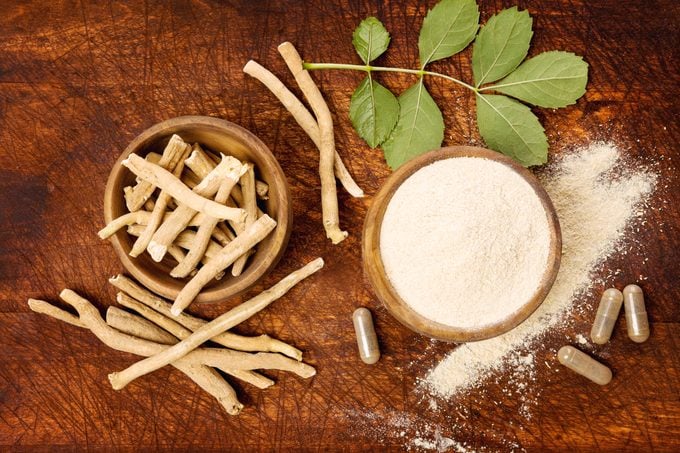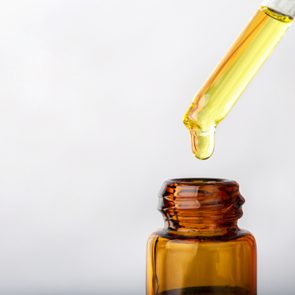What Is Ashwagandha? 7 Ashwagandha Benefits and Side Effects to Know
Updated: Jul. 06, 2022
Ashwagandha is everywhere these days, touted as a miracle cure for many conditions. But where does this herb come from...and is it really all that? Sort of, but there are some important cautions. Here's ashwagandha, explained.
What is ashwagandha?
A lot of people are talking about ashwagandha (pronounced aush-wa-GOND-a). Although usage of this herb dates back thousands of years, it’s now one of the supplements du jour. That’s thanks to a laundry list of potential ashwagandha benefits, including stress relief, male fertility, female sexual desire, and more.
An evergreen shrub grown in India and regions of Nepal, ashwagandha (or Withania somnifera, to be scientific) is an adaptogen. This means it helps people better control how they cope (or adapt) to stress. The actives in the ashwagandha root are called withanolides.
Technical language aside, think of ashwagandha as a chill pill that actually comes in capsule, powder, liquid extract, gummy, or tea form. Here’s why people are turning to this alternative medicine, in all of its iterations. Plus, we list a few potential ashwagandha side effects to keep in mind.
What’s the correct ashwagandha dosage?

Research from the independent supplement testing organization Consumer Lab suggests looking for an ashwagandha root powder or root extract containing at least 0.3 percent to 1.5 percent of withanolides.
“According to research, 500 to 600 milligrams for at least 60 days provides the most therapeutic benefit,” says Trevor Cates, ND, a naturopathic physician in Park City, Utah. But, she advises, this should be under the guidance of a professional.
“It’s best to start with a lower dose and only take higher amounts under the supervision of a licensed naturopathic doctor or other practitioner well-trained in herbal medicine.”
Cates and other health professionals explain the ashwagandha benefits that motivate people to try this herb in the first place.
Ashwagandha benefits for stress relief
Ashwagandha has a relaxing and somewhat soothing effect on the nervous system, Cates explains. “It activates the hypothalamic-pituitary-adrenal (HPA) axis and exerts GABAergic effects, which help reduce stress and anxiety and improve sleep,” she says. “When we manage our stress response, our sleep and focus are better,” she adds.
Some research found that ashwagandha reduces cortisol or stress hormone levels, which drives our fight-or-flight response. A study in a 2019 issue of Medicine backs this up: participants who took ashwagandha were less anxious and depressed and also showed decreased levels of two hormones the body produces in response to stress—cortisol and DHEA—compared with those who took a placebo pill. (DHEA is short for dehydroepiandrosterone.)
(By the way, could probiotics relieve stress, too? We’ve got answers.)
Ashwagandha to make you more fit
Research published in An International Quarterly Journal of Research in Ayurveda suggests that ashwagandha may boost fitness levels, too.
Fifty athletic adults took ashwagandha root extract supplements in the study. Researchers found that it increased their quality of life and their VO2 max, a marker of cardiovascular fitness that indicates the maximum amount of oxygen your body can utilize during exercise.
Ashwagandha benefits for women
Ashwagandha may provide different benefits and risks for men and women—specifically, there is some indication that this herb could improve sexual function in healthy women. For example, in one study published in BioMed Research International, one group of women took 300 milligrams of ashwagandha twice daily for eight weeks. Subsequently, on average this group reported reported improvements in arousal, lubrication, and orgasm than a group that received a placebo. (This is part of why ashwagandha is considered to be one of eight all-natural sex-drive boosters.)
It is essential to note that this herb may increase the risk for miscarriage and should not be taken during pregnancy, according to the National Library of Medicine.
Ashwagandha benefits for men
Other research on ashwagandha found that it could improve sperm counts and fertility in men by boosting testosterone levels, according to Amy Rothenberg, ND, a naturopathic physician in Northampton, Massachusetts.
“We do need help treating male infertility,” adds Mark Moyad, MD, the Jenkins/Pokempner director of preventive & alternative medicine at the University of Michigan in Ann Arbor. “Testosterone is expensive, and it would be nice to find something cheaper over the counter.”
For the moment, though, it’s too early to determine whether ashwagandha can fit this bill. “There is concern about raising testosterone as it can spur prostate cancer,” Dr. Moyad notes.
Other potential ashwagandha benefits
In addition to stress relief, this herb has historically been used to lower blood pressure, calm inflammation, and support immune system function, says Rothenberg, who adds that ashwagandha may also help to lower blood sugar levels by improving insulin sensitivity.
But again, currently, the U.S. Library of Medicine cautions that there isn’t enough research to back up these claims.
Ashwagandha side effects and cautions
Ashwagandha is relatively safe, but it may cause headaches, diarrhea, nausea, or vomiting. Allergic reactions are also possible.
There are a number of other concerns. If you have an autoimmune disease, this herb could rev up your immune system and increase your chances of having a flareup. There’s also a slight chance that liver injury can occur, Dr. Moyad says.
This herb should also be used with caution if you take other medications for blood pressure or to control your blood sugar levels.
Given its potential effects on the immune system, ashwagandha may dampen the effects of medications known to decrease immune system activity, such as those given to prevent rejection after an organ transplant, per the U.S. Library of Medicine.
And, once more, people who are pregnant or are trying to conceive should not take this supplement.
How to choose an ashwagandha supplement
Another issue with supplements, in general, is the lack of appropriate oversight. Unlike drugs, dietary supplements like ashwagandha do not need FDA approval before they are marketed. When Consumer Lab reviewed ashwagandha supplements to ensure they were true to their labels, 56 percent of the ones tested passed muster.
Wait… how is that possible? Under the Dietary Supplement Health and Education Act (DSHEA), vitamin manufacturers are essentially responsible for ensuring that a supplement is safe before it’s sold. The FDA can, however, act against any supplement that is misbranded or misleading in its labelling.
Also, many products contained lower amounts of withanolides than expected. Several products did get the watchdog group’s nod for quality and have withanolides consistent with efficacy in clinical studies. Their top pick for an ashwagandha product? GNC Herbal Plus ashwagandha extract. It provides a conservative dose of withanolides with an affordable price tag.
If you decide to give ashwagandha a try, Dr. Moyad suggests you should always look for products with a third-party seal of approval from U.S. Pharmacopeia Convention, NSF International, or ConsumerLab.com. It’s also a good idea to go directly to a company website and review the product’s certificate of Analysis (COA), which provides results of any and all testing of the supplements. If it’s not there, ask them to send it to you, he says.
Looking for more wisdom on vitamins and supplements? Check out these secrets that vitamin manufacturers don’t want you to know.

















